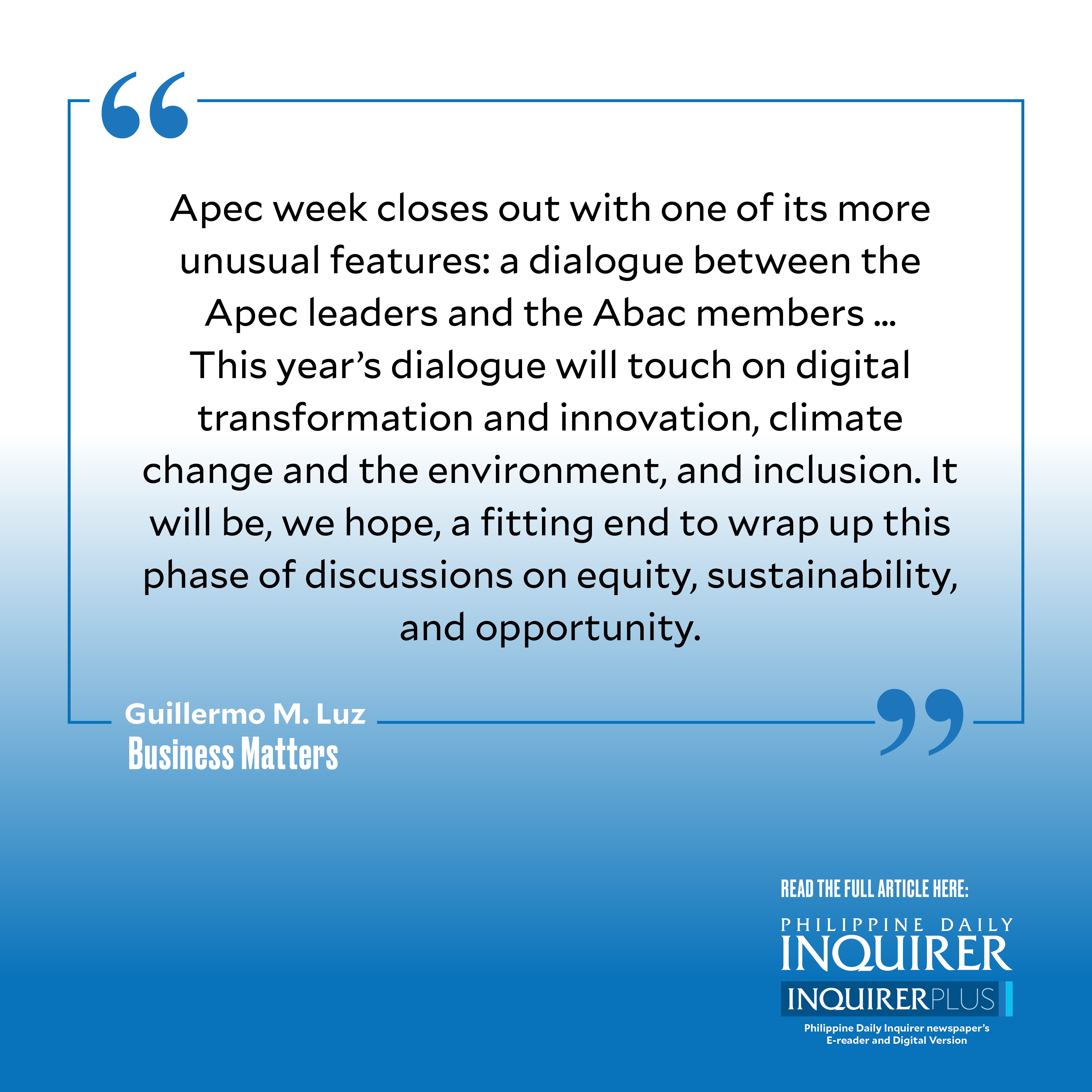‘Equity, sustainability, and opportunity’
San Francisco—We have just wrapped up our fourth meeting here of the Asia-Pacific Economic Cooperation (Apec) Business Advisory Council (Abac). Abac is a council of 63 business executives, three from each of the 21 Apec economies, all of whom are appointed by the president or prime minister (or leader in Apec terminology) of one’s respective country. The council meets four times a year to discuss and thresh out recommendations for a wide range of ministers and leaders.
It’s been a busy year for Abac in 2023. After three years of virtual and hybrid meetings during the COVID-19 period, this year had a full program of face-to-face meetings in Auckland, Brunei, and Cebu, culminating in a week-long run of meetings in San Francisco, California which covers the final Abac meeting of the year, Sustainable Futures Forum, Apec CEO Summit, and the Apec Leaders Summit.
Article continues after this advertisementIn all, Abac has managed to submit nine separate letters of recommendations to different ministers (e.g., trade, finance, health, energy, etc.), two statements on artificial intelligence (AI) and climate change, and its annual report to Apec Leaders, this year entitled “Equity, Sustainability, and Opportunity.”
The global economic landscape has been disrupted on so many fronts, not least of which by a pandemic, climate change, and AI—all with differing levels of impact on different economies and sectors such as micro-, small- and medium-scale enterprises, women-led businesses, indigenous entrepreneurs, and others.
Apec and Abac, remain committed to free, fair, and open trade. Collectively, the 21 Apec economies account for roughly 60 percent of global trade and well over half of global investments. But with the world becoming more fragmented and the operating environment becoming more fractious, pressure is on to create more practical solutions to enable small and large businesses to operate in this disruptive environment. Thus, Abac has been working on initiatives such as a supply chain resilience toolkit, and environmental, social, and governance (ESG) framework for small businesses, Apec cross-border paperless trade roadmap, and a cybersecurity toolkit, among others.
Article continues after this advertisementAI and climate change have taken prominent positions in business discussions globally. Generative AI is viewed as offering great potential for radical transformation. It is a fast-moving and dynamic field whose full impacts are not yet completely understood. Nonetheless, it is expected to bring great good to many sectors, including health care, education, energy, agriculture, transportation, and mobility, among others. On the other hand, ethical issues and ways of mitigating these risks are seen as necessary to ensure that there are responsible and inclusive approaches to generative AI’s use.
Though climate change has been talked about for decades, it is only now receiving a greater sense of attention and urgency as people begin to appreciate that its impacts are being felt at far larger and faster rates than originally estimated. It is a challenge that will not be going away soon; the world’s population now stands at eight billion, with anywhere from one to three billion in need of more energy in order to develop and enjoy a better of quality of life. We are in a delicate balancing act of providing more energy while lowering emissions.
Apec week closes out with one of its more unusual features: a dialogue between the Apec leaders and the Abac members. Opening with a special plenary session to go over the broad strokes of the Abac report to leaders, the real fun begins in the breakout rooms, where small groups of four or five prime ministers and presidents hold a dialogue with six to eight Abac delegates. This year’s dialogue will touch on digital transformation and innovation, climate change and the environment, and inclusion.
It will be, we hope, a fitting end to wrap up this phase of discussions on equity, sustainability, and opportunity.
—————-
Guillermo M. Luz is chief resilience officer of the Philippine Disaster Resilience Foundation and an alternate member of the Apec Business Advisory Council for the Philippines.
—————-
Business Matters is a project of the Makati Business Club (makatibusinessclub@mbc.com.ph).

















